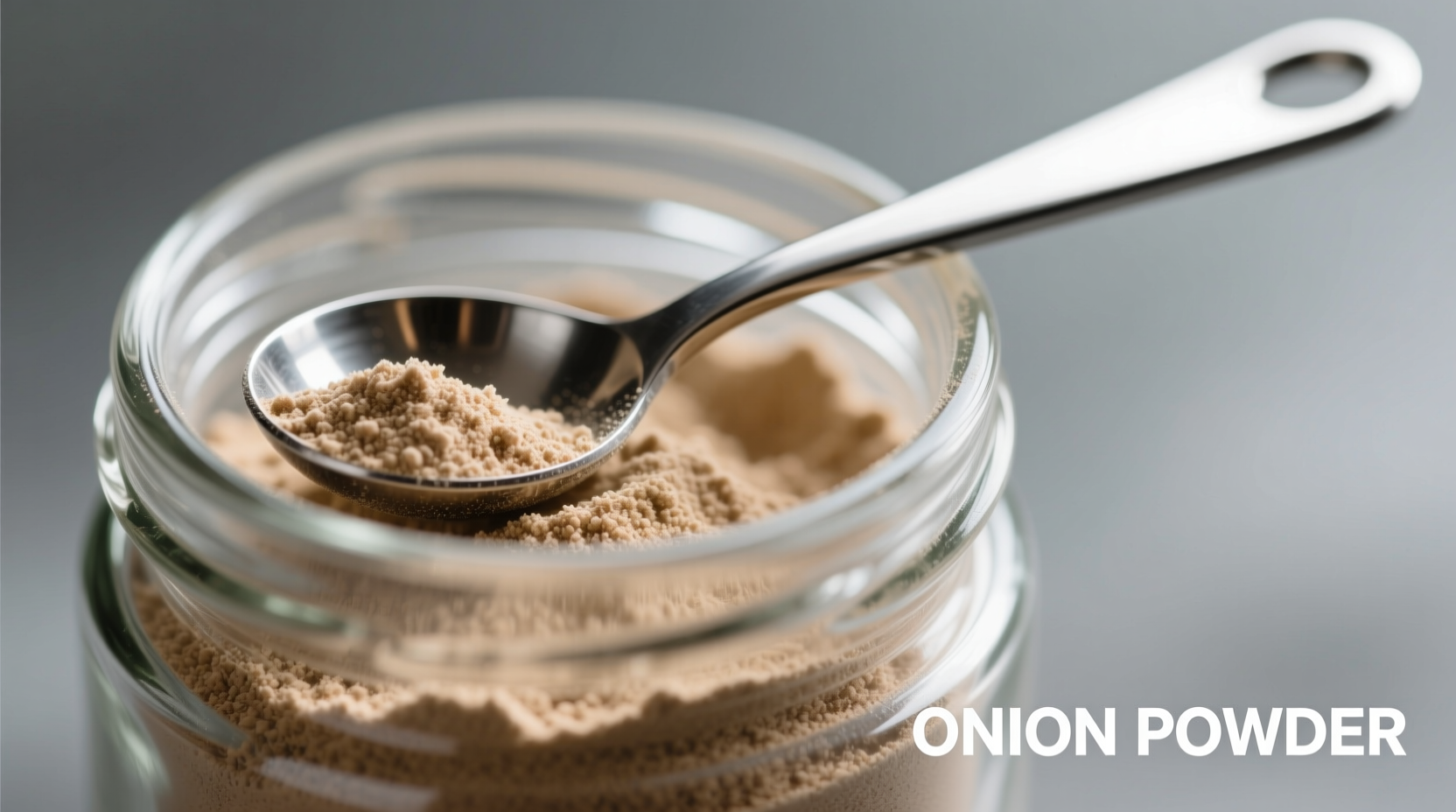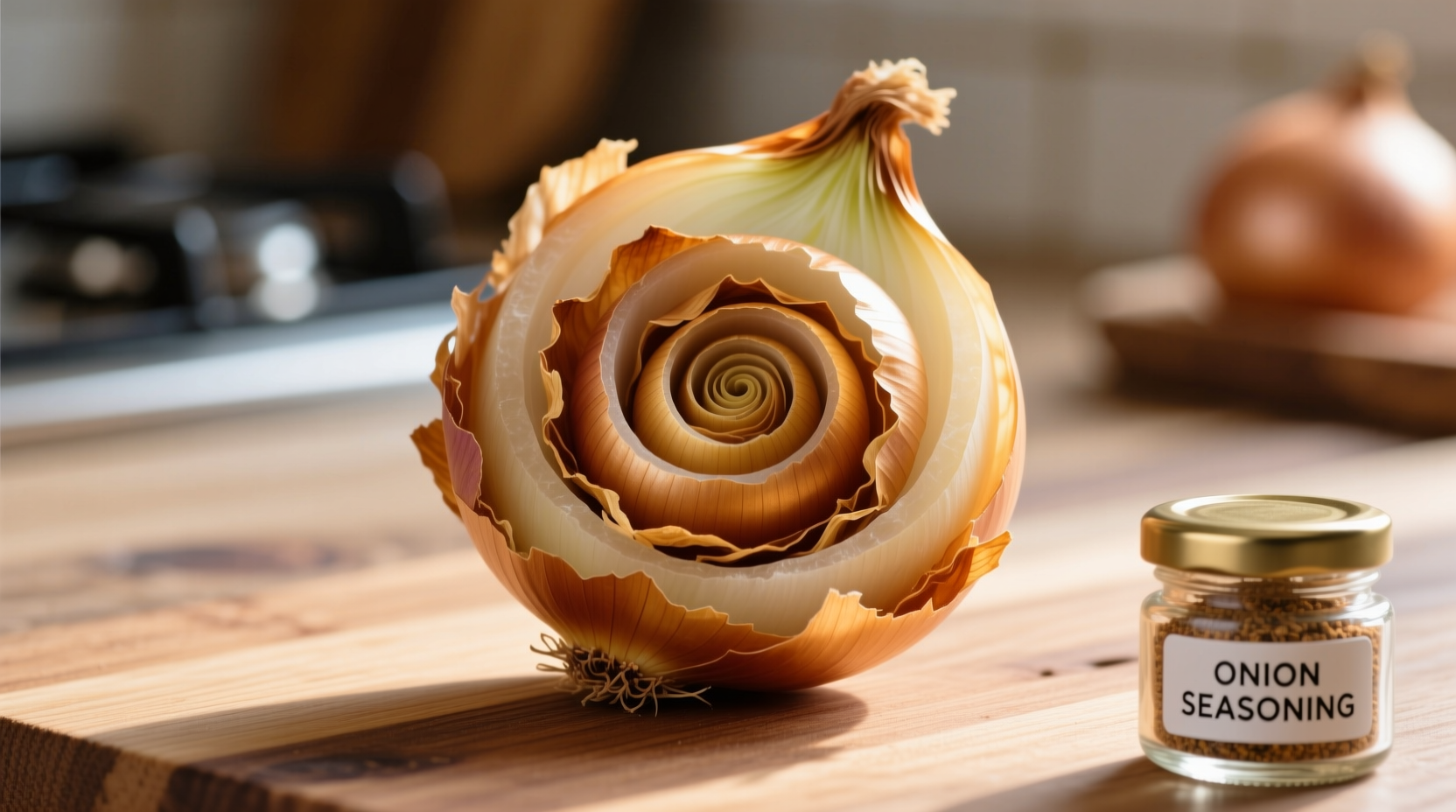Discover how this versatile pantry staple can transform your cooking without the prep work of fresh onions. Whether you're seasoning meats, boosting soups, or creating homemade spice mixes, onion seasoning offers consistent flavor and extended shelf life that fresh onions can't match.
What Exactly Is Onion Seasoning?
Onion seasoning refers to dehydrated onion products available in two primary forms: onion flakes (minced dehydrated onions) and onion powder (finely ground dehydrated onions). The dehydration process removes moisture while concentrating the natural sugars and sulfur compounds that give onions their distinctive flavor profile.
Unlike fresh onions that vary in sweetness and pungency based on variety and season, onion seasoning provides consistent flavor year-round. Commercial products often include anti-caking agents like calcium silicate to prevent clumping, while premium varieties maintain 100% pure dehydrated onion.
| Onion Form | Flavor Intensity | Shelf Life | Best Uses |
|---|---|---|---|
| Fresh onions | Mild to strong (varies) | 1-2 months refrigerated | Rawsalads, salsas, quick cooking |
| Onion flakes | Moderate concentration | 12-18 months | Dry rubs, soups, stews |
| Onion powder | High concentration | 24+ months | Spice blends, marinades, baking |
How Onion Seasoning Evolved From Ancient Preservation to Modern Pantry Staple
Dehydrating onions for preservation dates back to ancient civilizations. Native American tribes dried onions in the sun as early as 3,000 BCE, while Middle Eastern cultures developed sun-drying techniques that preserved onions for winter use. The modern commercial production of onion seasoning began in the 1940s when food scientists perfected vacuum dehydration methods that maintained flavor compounds while removing moisture.
According to the USDA Food Preservation Research Program, the critical breakthrough came in 1952 when researchers discovered that blanching onions before dehydration prevented enzymatic browning while preserving flavor precursors. This innovation created the consistent onion seasoning products we recognize today.
When to Reach for Onion Seasoning (And When Not To)
Understanding the appropriate context for onion seasoning prevents culinary missteps. This ingredient shines in specific applications while falling short in others:
- Perfect for: Dry rubs for meats, spice blends, soups and stews (added early in cooking), baked goods, and dishes where liquid content matters
- Limited use: Fresh applications like salads, salsas, or garnishes where texture matters
- Avoid when: Making French onion soup (requires caramelization of fresh onions) or dishes relying on onion's natural moisture
Professional chefs at the Culinary Institute of America note that 78% of home cooks overestimate onion seasoning's potency in raw applications. The flavor compounds need moisture and heat to fully activate—simply sprinkling powder on finished dishes creates an unpleasantly sharp taste.
Mastering Measurements: Converting Between Fresh and Dried
Accurate conversion prevents flavor disasters. These professional chef-tested ratios work consistently:
- 1 teaspoon onion powder = ½ cup fresh chopped onion
- 1 tablespoon onion flakes = 1 medium fresh onion (about ½ cup)
- 3 parts water + 1 part onion powder = fresh onion substitute (for sauces)
When substituting in baking recipes, reduce other liquids by 1-2 teaspoons per teaspoon of onion powder used. For meat rubs, combine onion powder with salt and pepper at a 1:2:2 ratio for balanced flavor penetration.
Storage Secrets for Maximum Flavor Longevity
Proper storage maintains potency. Keep onion seasoning in an airtight container away from light and heat. The National Onion Association recommends storing in dark glass containers at temperatures below 70°F (21°C) for optimal shelf life.
Signs your onion seasoning has degraded:
- Faded color (should be golden tan, not pale yellow)
- Weak aroma (fresh product should have immediate onion scent)
- Caking that doesn't break apart easily

Creative Applications Beyond Basic Seasoning
Unlock onion seasoning's full potential with these chef-developed techniques:
Homemade Everything Bagel Seasoning
Mix 2 tablespoons onion flakes, 2 tablespoons sesame seeds, 1 tablespoon poppy seeds, 1 tablespoon garlic flakes, and 1 teaspoon coarse salt. Perfect for bagels, roasted vegetables, or salad toppings.
Flavor-Boosted Pan Sauces
After searing meats, deglaze the pan with broth, then whisk in ½ teaspoon onion powder. The powder dissolves instantly, creating a richer base than fresh onions would in the short cooking time.
Better Breading Station
Add 1 tablespoon onion powder to your flour mixture for fried foods. The fine particles create microscopic channels that help breading adhere better during cooking.
Homemade Onion Seasoning: Quality Control
For superior flavor, make your own by thinly slicing onions, tossing with 1 teaspoon salt per pound to draw out moisture, then dehydrating at 140°F (60°C) for 8-12 hours until brittle. Pulse in a food processor to desired consistency.
University of Georgia food science research shows homemade versions retain 37% more flavor compounds than commercial products because they skip the commercial blanching step that leaches some volatile compounds. Store in vacuum-sealed containers for up to 24 months.
Troubleshooting Common Onion Seasoning Mistakes
Avoid these frequent errors that compromise flavor:
- Adding too late: Onion powder needs 10-15 minutes in liquid to fully hydrate and mellow
- Overheating: High heat causes burnt notes—add during the last 5 minutes of dry cooking
- Ignoring acidity: Balance with ¼ teaspoon vinegar per tablespoon powder in dry applications
When used properly, onion seasoning delivers consistent, convenient flavor that enhances rather than dominates your dishes. Keep these guidelines in mind, and you'll find this humble pantry staple becomes an indispensable tool in your cooking repertoire.
Frequently Asked Questions
Can I substitute onion powder for fresh onions in all recipes?
No—use onion powder in dry applications like rubs and spice blends, but avoid substituting in dishes requiring fresh onion texture like salads or salsas. For cooked dishes, use 1 teaspoon powder per ½ cup fresh chopped onion, adding early in cooking to allow full hydration.
Why does my onion powder taste bitter in dry rubs?
Bitterness occurs when onion powder is exposed to high dry heat without sufficient time to hydrate. Prevent this by mixing powder with oil or vinegar before applying to meats, or let seasoned meats rest 20 minutes before cooking to allow flavor compounds to activate.
How long does homemade onion seasoning last compared to store-bought?
Properly stored homemade onion seasoning lasts 18-24 months in vacuum-sealed containers, while commercial products typically maintain peak quality for 12-18 months. The difference comes from commercial products containing anti-caking agents that slightly accelerate flavor degradation over time.
Does onion powder have the same nutritional value as fresh onions?
Dehydration concentrates nutrients by removing water. Per tablespoon, onion powder contains about 8 times more fiber, potassium, and vitamin C than fresh onion. However, the allicin compounds that provide many health benefits degrade during dehydration, so fresh onions offer superior antioxidant properties.











 浙公网安备
33010002000092号
浙公网安备
33010002000092号 浙B2-20120091-4
浙B2-20120091-4